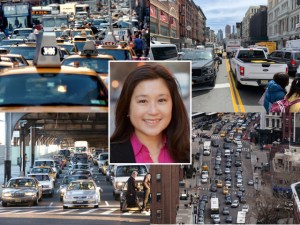The Car as Underdog, and Other Mind-Benders
From the New York Times’ new City Room blog comes a post entitled "Congestion Pricing: Has David Bested Goliath?"
Hint: "The answer might depend on who you think is the giant."
Which coalition has been winning so far in the congestion pricing wars?
So far, at least, the pro-congestion pricing forces have been on the
defensive, even though they appear to be much better organized and
financed and have the support of three bedrock organizations of
municipal influence: the Partnership for New York City, the Regional Plan Association and the Citizens Budget Commission.But it is not clear that supporters of congestion pricing have won
enough public support, despite having achieved broad support among
organized interests. Meanwhile, opponents of congestion pricing, like
the Queens Civic Congress, have had a lower test to meet; their goal is
to defeat the traffic fees by raising just enough doubt and skepticism — with a public that is already doubtful and skeptical.No matter that the overwhelming majority of commuters to Manhattan do
not need to drive, or that the money raised from traffic fees would be
used to improve mass transit across the city. The point is that the
opponents of congestion pricing, like the Queens Civic Congress, have
so far managed to create enough doubt around the idea — a doubt that
has swayed many Assembly members.
Of course it’s easy to raise doubt and skepticism about a complex issue when one’s arguments are largely unburdened by facts. Take this passage on Council Member David Weprin from today’s Metro, in which the paper itself — as does the City Room passage above — refutes a rote, yet mostly baseless, objection to congestion pricing.
"I represent a district in eastern Queens that for most people is
four or five miles from the nearest subway,” he said. "It is also not
accessible to buses. You can’t tell me that they’re going to start
building subways and changing bus lines in time if they’re going to
adopt this congestion tax now."Yet that is the stated intention of the Bloomberg
administration, which hopes to first increase bus service to areas that
lack subway access before implementing congestion pricing. More than
half of the projected $500 million federal grant would supposedly go
for transportation improvements. For example, one neighborhood in
Weprin’s district — Bayside — is already slated to get new and expanded
bus service under the mayor’s long-term sustainability plan, dubbed
PlaNYC.Weprin, though, remains unconvinced.
"The mayor is asking Albany to act now on the congestion tax and
to worry about the public transportation improvements later," he said. "That’s backwards."
So Weprin wants to kill the plan to finance the improvements he says are needed before the plan he wants to kill can be implemented.
David and Goliath? Sure, if this version has a looking glass…
